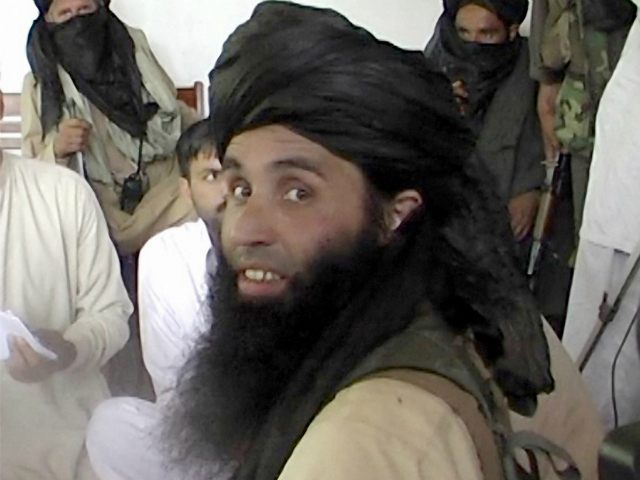The leader of Tehreek-e-Taliban Pakistan (TTP), Mullah Fazlullah, has been executed in a joint drone strike in Afghanistan carried out by the Pakistani army in collaboration with the United States military, news outlets in the Pakistan region report.
“Unconfirmed reports state that a drone strike was conducted on Fazlullah’s house in Afghanistan in which he was neutralised,” notes The Times of India. “However, there have been several reports of Fazlullah being killed in a drone strike in the past but they all turned to be false.”
Pakistan’s Geo News reports that the joint drone strike was carried out by the Pakistan army in coalition with the United States.
Zee News, also citing unconfirmed reports, notes that Fazlullah, also known as Mullah Radio, “was reportedly killed after being seriously hit in a drone strike in the Nangarhar region of Afghanistan.”
Noting that there has been no official confirmation, Daily Pakistan added that at least five people, including Fazlullah’s wife and son, were killed in the attack.
Last week, Geo News reported that the government of Pakistan had asked the U.S. to kill the TTP leader.
Pakistani Prime Minister Nawaz Sharif visited the White House in October 2015. The Pentagon and Afghanistan have accused Pakistan of providing sanctuary to Taliban terrorists.
Gen. John Campbell, the top commander of U.S. and NATO troops in Afghanistan, and a recent Pentagon report indicated that there is not a high concentration of Taliban terrorists in eastern Afghanistan’s Nangarhar province, located along the Pakistan border.
The Pentagon and the general described Nangarhar as stronghold of the Islamic State (ISIS/ISIL) branch in Afghanistan, known as the Khorasan Province (ISIL-K).
Dunya News points out that earlier reports suggested the TTP leader was living in Afghanistan’s Nuristan province, conceding, “We don’t know if he moved to Nangarhar.”
Nuristan is also located on the Pakistan border in eastern Afghanistan, north of Nangarhar. The two territories are separated by Kunar province.
Tehreek-e-Taliban Pakistan (the Union of Pakistani Taliban) recently claimed responsibility for an attack on the Bacha Khan University campus in Pakistan’s Khyber Pakhtunkhwa province, which borders Nuristan.
At least 22 people were killed and nearly 20 others injured in the assault.
Bacha Khan University is located in the Charsadda district near Peshawar, where TTP carried out an attack on a school in 2014, killing at least 141 people, including 132 students, and injuring scores of other people.
“Tehrik-e Taliban Pakistan (TTP) is an alliance of militant networks formed in 2007 to unify opposition against the Pakistani military. TTP’s stated objectives are the expulsion of Islamabad’s influence in the Federally Administered Tribal Areas and neighboring Khyber Pakhtunkhwa Province in Pakistan, the implementation of a strict interpretation of sharia throughout Pakistan, and the expulsion of Coalition troops from Afghanistan,” declares the U.S. National Counterterrorism Center (NCTC).
“TTP leaders also publicly say that the group seeks to establish an Islamic caliphate in Pakistan that would require the overthrow of the Pakistani Government,” it adds. “TTP historically maintained close ties to senior al-Qa‘ida leaders, including al-Qa‘ida’s former head of operations for Pakistan.”
Mullah Fazlullah was appointed leader in November 2013.
“Fazlullah is staunchly anti-Western, anti-Islamabad, and advocates harsh tactics underscored by his ordering the November 2012 attempted assassination of education rights activist Malala Yousafzai,” explains the NCTC. “TTP since 2008 has repeatedly publicly threatened to attack the US homeland, and a TTP spokesman claimed responsibility for the failed vehicle-bomb attack in Times Square, New York City, on 1 May 2010.”
“In June 2011, a spokesman vowed to attack the United States and Europe in revenge for the death of Usama Bin Ladin,” it adds. “A TTP leader in April 2012 endorsed external operations by the group and threatened attacks in the United Kingdom for its involvement in Afghanistan.”
The Guardian recently reported that a combination of drone strikes and military offensives has decimated the movement over the last six or so years, as successive commanders are executed and the terrorist group’s factions are forced out of their bases.
“Yet the TTP has retained the capacity to do serious harm, and as pressure has increased since the launch of a military campaign about 18 months ago, various factions have lashed out at Pakistan’s security forces and state,” noted the report.
Despite retaining its capacity to carry out attacks, “the TTP has fractured further, with many commanders leading their fighters across the frontier into Afghanistan, or simply going to ground,” acknowledged the Guardian.
“The authority of the nominal leader, Mullah Fazlullah, was already weak, and has now almost disappeared. This lack of unified decision-making explains why one TTP commander could proudly claim responsibility for the attack on the Bacha Khan University, before the principal spokesman for the movement issued a denial in which he described the killing of students in such an establishment as un-Islamic,” it adds.
While TTP has been officially designated a foreign terrorist organization by the U.S. State Department, the Afghan Taliban has not.

COMMENTS
Please let us know if you're having issues with commenting.